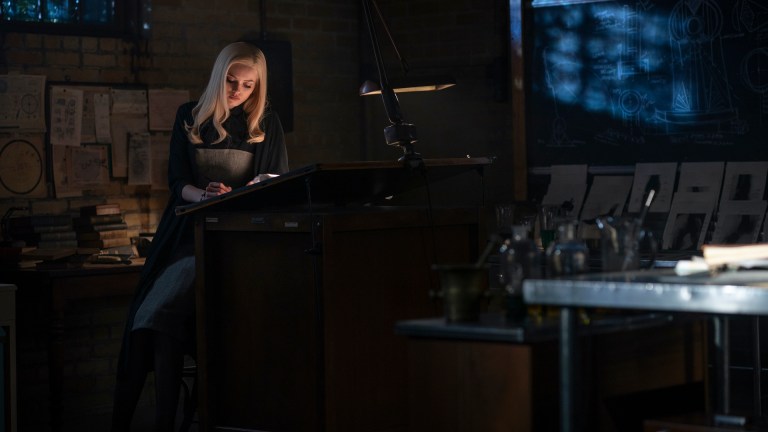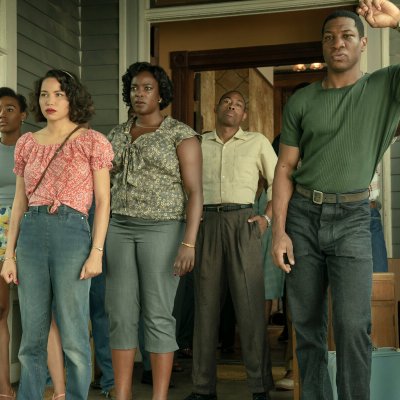Lovecraft Country Episode 10 Review: Full Circle
The season finale of Lovecraft Country gives our heroes a win, but at what cost?

This Lovecraft Country review contains spoilers.
Lovecraft Country Episode 10
Tic recites the spell to open the Book of Names, then he and Leti fall unconscious. Their subconscious/spirits are brought to an ancestral plane and it’s there they learn the truth about magic from the ancestors. They are tasked with casting Hannah’s spell, which will use Christina’s spell against her to take magic from the Braithwhites. The ancestors help Tic and Leti heal Dee, then send them back to their bodies to enact their plan.
The season finale of Lovecraft Country is entertaining but emotionally hollow. Maybe it’s the fact that the nine preceding episodes have thrown us into the fire —literally— and put us and the characters through some of the worst racial violence in the history of this country. Or perhaps, it’s that our heroes have already proven their capacity to persist, so winning in itself is not enough. Tic, Leti, Montrose, Hippolyta, Ruby, Diana —and George in the brief amount of time we had him— have overcome pretty much from the moment they appear on screen. But, save for George, they all come away from the horror mostly unscathed, and generally stronger than before.
The problem with Lovecraft Country is that almost every episode is anxiety-inducing and heartbreaking, and emotionally taxing, each leaves the audience raw. When you spend an entire season pushing us to our limits, you expand our limits. What may have felt like a truly moving triumph in episode seven feels like a foregone conclusion by episode ten. Lovecraft Country gives us the ending we expected, and in doing so, fails to deliver on its promise or justify the triggers and traumas it inflicted on its characters and its audience.
“Full Circle” doesn’t stand up to the episodes that come before it. Our protagonists are OP by this point. They have been through too much, and this is not the worst thing they’ve faced, not by a long shot. Treating the confrontation in this episode like the biggest of the season undermines and devalues all of the truly horrific experiences these characters have had in the name of empowerment. What’s a little bloodletting to being shot to death then coming back to life, or becoming a ghoul and losing your arm, or shedding an entire body worth of flesh and bone…
What Christina does to Tic to gain immortality pales in comparison to the things that have been done to our heroes, and Black folks on the periphery, in the name of good ol’ fashion racism. We watched a woman burn to death. A boy was shot in the head. Black folks were beaten and gunned down in the streets. This was all in the last episode. How do we come away from all of that trauma, which compounded all of the trauma before it, thinking a little spat with Christina Braithwhite would be even remotely rewarding? I expected Christina to be a red herring, and frankly, I’m surprised she was treated with so much gravitas in this finale.
Stripping magic away from Christina and all whites, by proxy, does not have the impact that it should. She has mostly operated in a way where her hands are free of blood, and making her the totem for this spell feels less like justice, and more like an easy metaphor. She is the embodiment of white magical power in this show. But she is also human and fallible. Her relationship with Ruby, which was an utter waste of storytelling potential, took away most of her mystique. By this episode, we’ve seen Tic and Montrose do worse things than Christina has done. And we know that her only real advantage over them is a better grasp on magic. With the ancestors’ help though, the Freemans are on mostly equal footing, so the win feels all but assured.
Taking magic away from white folks is a win, but it doesn’t feel like one. Especially when it comes at the cost of Tic’s life, which feels like an avoidable sacrifice. We know when the surviving Freemans, Leti, and Ji-ah leave Ardham, they are returning to a world where Whiteness still has power. They are returning to a world that is still anti-Black. We do not get pay off for the pain and suffering we’ve endured as the audience to see our characters get to this place. There is no real sense of victory, even when Diana uses her cyborg arm to crush Christina’s fragile, mortal neck. Having Dee be the one to do it also feels cheap. We know everyone can get it in Lovecraft Country, and everybody does, but there is power in letting people maintain some warmth or innocence. Montrose was right there. Leti, who has lost her sister and her child’s grandfather to the Braithwhites, was right there. It seems the writers were intent that everyone be a conduit for violence.
Why did Hippolyta travel to another dimension to become an explorer, a warrior, an artist, and all of these things, only to do…. nothing, when it counted? Similarly, why build Ruby up as this Bad Bitch who finally chooses herself, her desires, and her own peace only to have her acquiesce to her sister once again and be discarded like nothing? Both of these Black women (darker-skinned I feel the need to point out) are empowered throughout the season, only to be benched in the finale so (light-skinned) Leti, and Ji-ah (Korean), could be the heroes. I love Ji-ah, and I wish she got a better resolution with Tic, but she was a deus ex machina where they had other options that could have better utilized characters we’ve spent much more time rooting for.
I love the idea that Hannah’s family have been working on a spell to strip all white people of their magic, because that makes broad sense. But it does not make sense functionally, and the fact that it will not be explained will keep me up at night. Tic has the blood of white wizards flowing through him, as does his unborn son. How does the magic differentiate, and what about mixed-race Black folks who are even more closely related to their magical white ancestors? I understand that intention is a crucial element to spellcasting, but who’s definition of white does that intention follow? And how does this help? Will all Black folks with magical ties just know? This is a mid-season storyline that requires several proceeding episodes to fully explore, but we get it at the end of the season, with no definitive answer as to whether the story will continue.
I let Misha Green & Co. play me because I naively believed Lovecraft Country had a destination and I will admit to being wrong. But I don’t take back any of the positive assessments I have for other episodes, because what worked for me worked. Though, I expected them to coalesce into a truly worthwhile and fulfilling conclusion. The issue now is that those episodes are more powerful standalone, they have better confrontations and better resolutions, and they are diminished by being attached to such an anticlimactic season finale.
